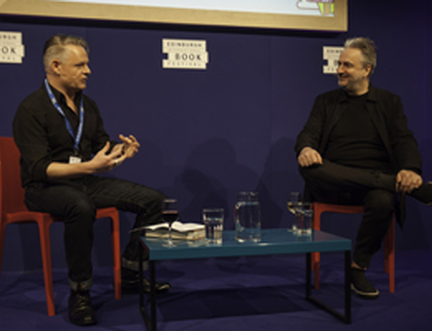More articles Friday 26 August 2016 2:00pm
David Bowie's 'Representative on Earth' Strives to Encompass an Extraordinary Life

David Bowie could have laid credible claim to being a living artwork - and his recent biographer Paul Morley also has some experience of that state. Morley made his first attempt at writing a book on Bowie when he was invited to be a component of the exhaustive exhibition on the singer’s life and work launched at the Victoria and Albert Museum in 2013. “They put me up as an installation,” Morley told the Book Festival last night, “to write a book in a weekend.” The idea appealed, partly because Bowie himself frequently imposed stringent restrictions on his creative process and partly because Morley was reminded of the methods of journalism in which he himself had been schooled. “That’s how writing about music was in the 70s – it was very fast; it was half-crazed sometimes.” Moreover, as it turned out, “I’ve got a lot to say about David Bowie.”
So did much of the world when Bowie died earlier this year, soon after the release of a triumphant final album and after a cancer diagnosis that he had kept secret. It was at this point that Morley, surrounded by condensed accounts of and passionate personal responses to Bowie’s life, resolved to transform his long-standing fascinating into a full-scale book. This time, it took him ten weeks. The result is, he said, “very personal. I’m definitely not saying this is a definitive book. It’s my David Bowie.”
The approach is impressionistic and mercurial, in recognition of the subject’s own continual need to change. “I give you glimpses of Bowie almost as if you’re on a speeding train. You don’t want to fix him down. I liked the idea of everything about the book still being provisional, not being settled, always moving – like his mind.” Bowie’s own restlessness, Morley said, extended to actively refusing the comforts of stable fame and adulation. “When he has success, he sabotages it. He doesn’t want to belong that securely to anyone.” A fierce desire for success co-existed with a need to subvert it. “He needed to have hits, but he also had this fantastic avant-garde sensibility.” His rise to fame occurred at a moment in which the mainstream and the artistic fringes were cross-fertilising as never before. “People like Bowie were using pop music to express very complicated emotional responses to the world, and transmit them directly to teenagers. They had the sensibility of artists, but what they found most interesting was popular culture.”
While Morley acknowledges the specialness of that moment – “You could literally feel the culture change; you could feel your thinking change” – he doesn’t share the conviction of some nostalgists that the best is all behind us. “I’m not sentimental for a golden age; I think it was an age on the way to something else.” Internet culture, prefigured in Bowie’s shifting personae and constructed realities, presents new creative possibilities. “What’s about to happen is all of these extraordinary ways in which you can combine your own personality with technology.” Bowie, he says, might not even be going into music if he had been born later – “He probably would have been more like the guy who invented Pokemon.”
Subversive words, but what else but subversion would one expect from – as he puts it – “David Bowie’s representative on Earth”? Morley said that he owes Bowie not just the pleasure of the music and the inspiration for the book, but the spur for his whole career. “He inspired me to be a writer. He showed me that the rhythm, the shape, the power of a sentence can be as important as what it’s saying.”

 Major new partnership with Celtic Connections
Major new partnership with Celtic Connections 

